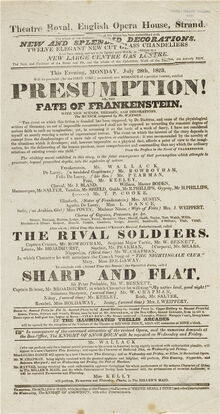
Playbill for performance of Presumption; or The Fate of Frankenstein at English Opera House July 1823. http://www.nlm.nih.gov/exhibition/frankenstein/exhibition4.html
Presumption; or, The Fate of Frankenstein was written by Richard Brinsley Peake in 1823. This melodramatic play was the first adaptation of Mary Shelley's Frankenstein; or the Modern Prometheus and led to a second printing of her novel. The play was first performed at the English Opera House in London on July 28, 1823 and continued throughout that summer with a total of 37 performances (Behrendt, Introduction). The play was then performed off and on again through the year 1850. Of important note is the fact that actor T.P. Cooke played the monster over 350 times (Forry, pg 17).
Synopsis[]
Peake's adaptation of Mary Shelley's novel portrays the story of Frankenstein as he creates a monster, known as the Hobgoblin. Often shown through the concerned eyes of his bumbling servant, Fritz, and his esteemed friend, Clerval, Frankenstein's work is brought to light. This play brings Mary Shelley's famous characters to life in a series of three acts, each of which highlight the important themes of community and romance in a unique way.
Major Themes[]
Community[]
One main theme amplified in this adaptation is community. Most notable is the addition of Frankenstein's servant, Fritz. He is the only person Frankenstein allows in his vicinity during his experiments.
In the opening scene, Clerval shows concern for Frankenstein's health and continuous work in his lab, just like in Mary Shelley's novel. However, in the play, Clerval offers to pay Fritz to find out what work Frankenstein is doing. Clerval's actions are significant by giving the audience a feeling of community, that Frankenstein isn't alone, which is very different from the isolation established in Shelley's novel.
By having Fritz and Clerval with Frankenstein, there is a diffusion of responsibility for the creation of the Hobgoblin. Fritz states to Clerval, "Now my shrewd guess, sir, is that, like Dr. Faustus, my master is raising the devil," sharing that he has a good idea of what Frankenstein is up to (Presumption, Act 1, Scene 1). Neither Clerval nor Fritz try to stop Frankenstein in the midst of his work, even though they show concern for his welfare.
Although Frankenstein destroys the monster in the end by himself, his friends rush to try to help him if they can. Fritz states, "Oh, I don’t know, there’s Mr. Frankenstein gone after the great creature, Mr. Clerval and Mr. Felix have gone after Mr. Frankenstein, and I’m going after them all," displaying the community the men share with Frankenstein (Presumption, Act III, scene IV).
Romance[]
Since this play is a melodramatic adaptation there is more emphasis and amplification of love and relationships as a whole. Essentially, the play is overly emotional and sentimental, hence the love songs and love confessions.
The romances in Peake's play bring forth critiques of marriage and domesticity. The only married couple is the lower class couple Fritz and Ninon. There is a distinct difference in how they speak to each other in comparison to how Frankenstein talks with Agatha, Felix with Safie, and Clerval and Elizabeth. For example, Ninon yells, "Fritz! Fritz! Where is my stupid husband?" and then, "You careless, good-for-nothing fellow," indicating her contempt and discontent with her spouse (Presumption, Act III, Scene I). Meanwhile, the unmarried couples speak to their loves with highly poetic language. For instance, Safie says to Felix, "Fi, Felix! in open daylight. You will deepen the blush of your Eastern rose," then they begin to sing of their love for each other in a duet (Presumption, Act III, Scene I). The unmarried couples seem to represent an ideal love/romance that Peake may be suggesting doesn't exist in a married relationship.
Marriage is present in Mary Shelley's novel with the betrothal of Victor to Elizabeth. The fact that Victor chooses to stay away and not see Elizabeth in the novel suggests that he was pushing away domesticity as a whole. This is not the case in Peake's play. Frankenstein clearly wants to be with Agatha, as he says, "Agatha, you shall be mine!" This suggests no indication that he would shy away from marriage (Presumption, Act III, Scene I).
Reception[]
This play was a popular success at The English Opera House. In a review from July 30, 1823, the London Morning Post stated, "The representation of this play on the stage is of astonishing, of enchanting, interest" (Behrendt, First Reviews). After attending the play herself, Mary Shelley is quoted in a letter saying, "But lo and behold! I found myself famous!" (Playbill for Presumption: or the Fate of Frankenstein!, Shelley's Ghost).
Significance of Adaptation[]
Presumption; or the Fate of Frankenstein is the first adaptation of Mary Shelley's Frankenstein; or the Modern Prometheus. Peake made many significant changes that have become mainstream both in adaptations and in people's understanding and knowledge of the Frankenstein story.
Peake's adaptation eliminated Walton's frame narrative with which the novel opens. This is significant because Walton creates credibility and a didactic frame to Shelley's novel by situating Victor's creation of the creature as truth. The deletion of Walton became mainstream in most adaptations following in Peake's wake.

Igor- Young Frankenstein(1974) http://genius.com/Ultramagnetic-mcs-mc-champion-lyrics#note-328286
Furthermore, the iconic role of Frankenstein's servant is established. In Peake's production this servant is Fritz, but in later adaptations the lab assistant becomes known as Igor. Fritz is a fool character that isn't very intelligent in order to create comic relief in Presumption. In many adaptations, this character takes on physical deformities along with mental handicaps. For example, he is often seen with a humpback, and odd eyes like in Young Frankenstein(1974).
In addition, Peake's portrayal of the monster as mute, blue, and very large became a significant identity for the Frankenstein creation. T.P. Cooke became famous as the monster with his large stature and popular portrayal of the speechless creature on the stage through pantomime (Romantic Circles, Presumption). In the cult classic Universal films, Frankenstein(1931) and The Bride of Frankenstein(1935) directed by James Whale, Boris Karloff became the face of the monster. Whale's monster was mute with an enormous physique and square head, duplicating in many ways the image created by Peake. The dramatic difference between these portrayals of the creature and Shelley's monster is the lack of language. This creates a being less human and more monster with the emphasis on the "otherness".
Finally, the spectacular destruction of the monster as the resolution of the play becomes an essential part of the story-line throughout the years. Peake ends the play with Frankenstein destroying himself and his creation in an avalanche.
The popularity of this adaptation resulted in a second printing of Mary Shelley's novel. Without Peake's adaptation, Shelley's creature may not have become the iconic household monster that is recognized by so many people today.
References[]
Forry, Steven Earl. "The Hideous Progenies of Richard Brinsley Peake: Frankenstein on the Stage, 1823 to 1826." Theatre Research International11.01 (1986): 13-31.
Peake, Richard Brinsley. Presumption; or The Fate of Frankenstein. London: English Opera House, 1823. Print.
"Romantic Circles." Behrendt, Stephen C. Web. 15 Mar. 2015. <http://www.rc.umd.edu/editions/peake/apparatus/introduction.html>.
"Shelley's Ghost." Playbill for Presumption: Or, The Fate of Frankenstein! Web. 10 Mar. 2015. <http://shelleysghost.bodleian.ox.ac.uk/?location_id=105#Description>.
Shelley, Mary Wollstonecraft, and Susan J. Wolfson. Mary Wollstonecraft Shelley's Frankenstein, Or, The Modern Prometheus. 2nd ed. New York: Pearson Longman, 2007. Print.
Author: Megan Rozzana
